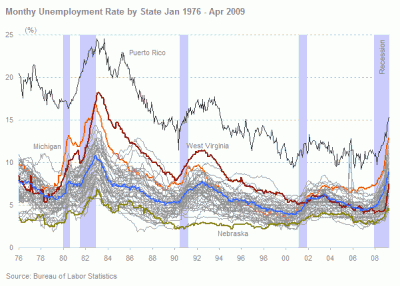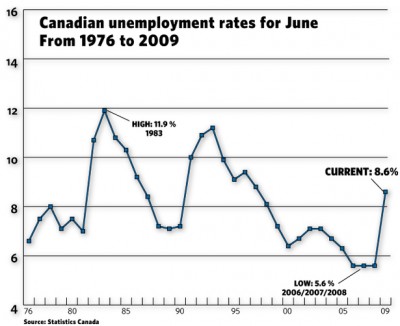
Greetings from Kingston, Ontario. Happy Civic Holiday/Provincial Day weekend to many Canadian readers.
José’s post on the Democrats and the Voting Income Gap got me thinking about historical unemployment, which was 9.6% in June of 2010. One of the things to recall is that recessions and episodes of nationwide high unemployment tend to be short. Mobilizing lower income voters and increasing numbers of the middle class should be easier for the Democrats over time, if The Big Recession persists. Moreover, it’s not clear that the Republicans are offering platforms that are resonating outside of their base.
Looking at the Canadian unemployment rates, there are lingering eras with years of rates being over 8%. Generally speaking, these eras of high unemployment correspond with the rise of the fortunes of the New Democrats, a left-centre pro-labour party.

The NDP saw surges in Parliamentary seats in the elections of 1984 and 1997, in the midst of eras of high unemployment. Currently, the NDP is polling relatively strongly, although so are the Greens, which may fragment the vote on the left. Stephen Harper’s minority Conservative government is hanging on because the Liberal Party is in disarray, with both of the major parties {Liberals & Conservatives} being relatively unpopular.
Lessons for the US?
It’s the economy, stupid. The Big Recession is hitting the middle class and rhetoric is only going to go so far. A big question is whether Democrats are willing move beyond centrist policies and if {a big if} they go towards Keynesianism, how will that be implemented?
Song:: Heaven 17-‘This Is Mine’
Twitterversion:: [blog] The politics of unemployment. Looking at economic eras in Canada & the US #ThickCulture @Prof_K

Comments